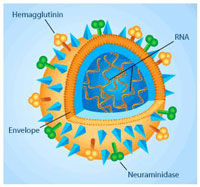Pieris Announces Positive Preclinical Data on c-Met Anticalin Drug Program
Pieris AG announced preclinical data for its proprietary PRS-110 Anticalin compound, which targets the c-Met receptor, demonstrating a dose-dependant reduction of tumor growth in a xenograft mouse model. The results provide an indication that an Anticalin approach to antagonizing the c-Met pathway may be of significant therapeutic value in treating cancer. A broad body of research has shown that c-Met plays a role in several mechanisms by which cancer cells proliferate and escape programmed cell death.
“These preclinical data firmly support our conviction that an Anticalin, which is monomeric by nature, is particularly suited for antagonizing a receptor activated through dimerization such as c-Met,” stated Stephen Yoder, CEO of Pieris. “Based on the strength of these data, we have initiated additional studies in multiple models to further validate this exciting compound.”
Produced in a tumor xenograft mouse model of cancer autocrine for the production of human HGF ligand, the data show potent dose-dependant inhibition of tumor growth by PRS-110 as compared to the untreated animals. PRS-110 targets c-Met, or mesenchymal-epithelial transition factor, which is a receptor often activated on cancer cells, and plays a role in cancer cell proliferation, metastasis and angiogenesis.
Pieris has developed its anti-c-Met PRS-110 compound using its proprietary Anticalin technology. Anticalins are engineered lipocalins, endogenous low-molecular weight human proteins typically found in blood plasma and other body fluids that naturally bind, store and transport a wide spectrum of molecules. Through its proprietary libraries, the company can rapidly generate Anticalins against a broad spectrum of therapeutic targets.
Most read news
Organizations
Other news from the department research and development

Get the life science industry in your inbox
By submitting this form you agree that LUMITOS AG will send you the newsletter(s) selected above by email. Your data will not be passed on to third parties. Your data will be stored and processed in accordance with our data protection regulations. LUMITOS may contact you by email for the purpose of advertising or market and opinion surveys. You can revoke your consent at any time without giving reasons to LUMITOS AG, Ernst-Augustin-Str. 2, 12489 Berlin, Germany or by e-mail at revoke@lumitos.com with effect for the future. In addition, each email contains a link to unsubscribe from the corresponding newsletter.




















































